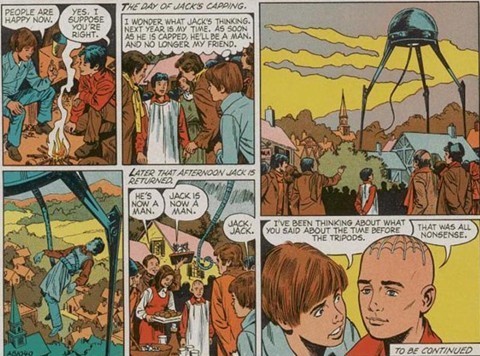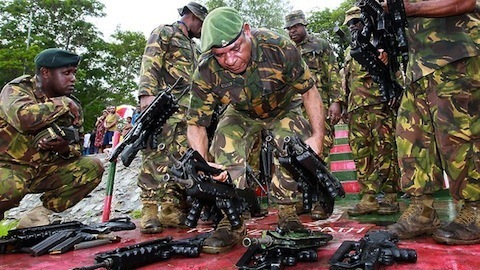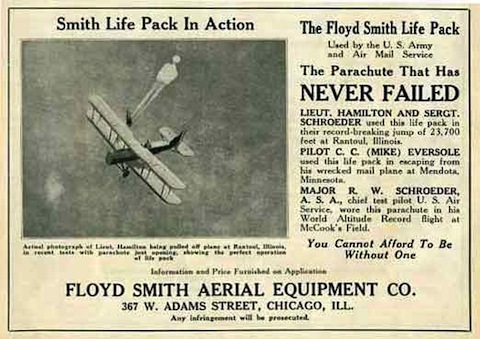Brendan I. Koerner's Blog, page 27
February 8, 2012
Exit the Tripods

Saddened to hear of the passing of John Christopher, creator of one of my formative sci-fi experiences: the harrowing Tripods Trilogy. As I discussed nearly two years ago, Christopher's tale of alien overlords was far more than crackling adventure yarn; it also centered on a powerful metaphor for parenthood that I admire to this day.
Check out the illustrated version of the trilogy's first installment here. There are few better examples of young-adult fiction that nail the narrative trick of using a physical journey to symbolize an emotional journey.
February 7, 2012
Live Spot in Soho

If you have access to the New York City subway system, please consider coming down to Housing Works Bookstore Cafe this evening to check out Microkhan in the flesh. I'll be performing as part of the revamped Adult Education lecture series, waxing poetic about a certain Soviet hammer thrower who has gotten much attention 'round these parts. I'll be bringing along some vintage Soviet film clips to aid the storytelling, so please do come if you have a thing for Leningrad's late '70s funk scene.
February 6, 2012
Word Association
Just slammed today, with both reporting for my Wired column and preparations for tomorrow's performance in Soho. Leaving you with some classic Europop and some salient thoughts on creativity from the great Sean Price:
HipHopCanada: What starts your creative process?
Sean Price: The beat. The beat'll tell me what to do. And sometimes I have moments where it'll seem like writers block so I'll just throw a word on the paper, like Botswana. Like my song "Figure 4." I just wrote Botswana and then a whole bunch of shit came after that. I don't know, there's really no method to it, I just write. I don't really believe in writer's block, really.
Gonna try this the next time I get into a creative jam. My word will be "Papua."
February 3, 2012
The Knife Thrower's Assistant
A big challenge I've faced with my book is the difficulty of grasping the rationales of truly eccentric characters. Even when I've been able to interview such folks, I rarely come away with a full understanding of why they made certain choices—their reasoning tends to be opaque, at least to a fairly normal bloke like me. Developing the empathy necessary to make their stories come alive thus requires a lot of focus and thought.
One way I've tried to overcome this obstacle is by boning up on the life stories of unusual individuals. I've lately been on a circus kick, which brought me in contact with the tales told by several knife thrower's assistants. Perhaps my favorite such story is that of Ula the Painproof Rubber Girl, who tells her story here. This is the passage that really gets to the heart of why she does what she does:
I guess I've been aware of my own mortality from a very young age. There are so many things you can't see coming. You can't see death coming. You can't see Mt. Vesuvius erupting. The probability of avoiding danger is higher with knives than against things that I can't see or control here in New York City. The carpet could be pulled out from under you at any second and you'll never see it coming, but I'll see a knife coming if it's going to hit me.
The way I read this, every knife that misses Ula by an inch represents a little triumph over her greatest fear. And the thrill of those tiny, regular conquests is what draws her to keep doing something that, by any rational standard, is completely foolish. Call it an addiction to denying death.
(Image via The Circus Blog)
February 1, 2012
The Crunch Begins
Gonna spend this unusually warm Queens day tackling the book, having finally surfaced after a ten-day stretch of Wired work. I have roughly 648 hours before the first three-quarters of the first draft is due, so I'm feeling the heat. Enjoy a track culled from the latest installment of Fresh Produce, and see you back here tomorrow for a post about the lives of minor circus employees.
January 31, 2012
Mutineers Move Markets

The recent unpleasantness is Papua New Guinea provides a salient reminder that the global financial system, despite employing some very sharp minds, often acts on impulse. In response to the recent mutiny outside Port Moresby, Standard & Poor's has slashed PNG's credit rating. An S&P analyst explained the firms rational thusly:
We have these ratings under surveillance all the time, but we fully factor in, I mean the rating is B-plus, it factors in significant political risk already, but when we see mutinies of the type that we've been witnessing over the last few days, that is a true trigger for us that the levels of political risk are that much more higher than what we've been witnessing.
And so what did the analyst mean by "mutinies of this type"? As this piece points out, the revolt was by no means a mass movement:
Of the 200 troops [at the barracks], only about 30 were believed to have been involved in the mutiny, which began last Thursday under the leadership of Michael Somare's appointee, Colonel Yawra Sasa.
Furthermore, those thirty mutineers were so half-hearted in their attempt that they readily swapped their guns for amnesty. As this insightful story points out, the mutiny was just a sideshow in a political clash that has been going on for months—a battle between Sir Michael Somare and Peter O'Neill over the prime minister's office, a prize that will guarantee them awesome powers of patronage.
The mutiny will ultimately do nothing to alter PNG's politics—it's impact pales in comparison to, say, the December Supreme Court ruling that gave Somare some measure of legitimacy. But the foreign financial wizards who decide the country's economic fate only pay attention when something sensational occurs—even if that something is totally inconsequential.
(Image via The Australian)
January 30, 2012
The Scribe Mind
I recently finished up Bill Buford's Among the Thugs, which is an absolute beast of a book. Aside from that great apocalyptic party scene in Bury St. Edmunds, there's a terrific set piece in which Buford gets pummeled by Italian riot cops. I love the way he recounts his thought process while being savaged with batons—it makes me wonder whether only writers' minds work this way:
All this was exceptionally painful, as would be expected, but my experience of it was different from that of the other who were being beaten up. Their experience was one of simple pain. For me, it was more complicated, because I knew that I would be writing about it. While being beaten up, I was thinking about what it was like being beaten up. I was trying to retain the details, knowing that I would need them later. I thought for instance that this experience was not so different from the one I had witnessed in Turin several years before when a Juventus fan, who had also surrendered, was beaten up by a number of Manchester United supporters. I thought of the fact that I could even think of this coincidence and marveled at the human mind's capacity to accomodate so many different things at once. And I thought about that, the fact that, while being beaten up, I could think about the human mind's capacity to accomodate so many different things at once. I thought about the expenses I had incurred and was grateful that I was going to get something out of this trip after all. But mainly I was thinking about the pain. It was unlike anything I had known and I wanted to remember it.
…and I wanted to remember it. Amazing to realize that an individual under such pressing physical duress could have such immediate perspective. But when your life is given over to telling stories, this is the default approach to every situation. There's always a little voice chirping in your ear, "Imagine how this will sound on the page."
January 27, 2012
Write Your Name Across the Sky

One of the book-related research tangents I've become ensnared in is the early history of parachuting. As you might suspect, the development of this important life-saving technology produced more than a few martyrs to the cause, as well as some heroes with complicated backstories. One of my favorite examples from the latter category is Carroll Eversole, an early airmail pilot who believed he could make a mint in the parachute development game. Like many inventors of that era, he saw nothing wrong with risking his neck to prove his technical savvy:
On February 18, 1921, Eversole was flying a dreaded twin de Havilland airplane from Minneapolis, Minnesota, when shortly after takeoff, and using a parachute, he bailed out of the airplane. A Chicago newspaper which wrote excitingly of this event, the first airmail pilot to survive a jump from a mail airplane, noted that the chute was "one of his own making." Other witnesses remembered Eversole taking time to examine the parachute in detail before taking off. Officials investigated the crash and determined that Eversole had used the event to publicize the new parachutes, destroying an airmail airplane in the meantime. Eversole was quickly fired. His fellow pilots had mixed feelings about Eversole's stunt. Few thought what he did was right, but none of them were sad to see a twin de Havilland airplane smashed into pieces.
Eversole had an alternate explanation for his post-jump dismissal: He claimed that he was fired for blowing the whistle on the drunkenness of U.S. Postal Service mechanics, whose incompetence led to the deaths of numerous airmail pilots. This excuse wasn't enough to get his termination rescinded, but it did cause some USPS heads to roll.
What I'm missing is evidence that Eversole's skydiving gamble ever paid off. Though his stunt was incredibly bold by modern standards, it was pretty much par for the course back in those days. More important, the market was flooded with worthy competitors; there is no single parachute design that trumps all others, given the personal preferences of pilots and the vagaries of aircraft. Based on the advertisement above, it seems that Eversole eventually ended up in some sort of business relationship with parachute manufacturer James Floyd Smith, a man known for his litigiousness. Here's to hoping that Smith treated Eversole with the respect due a man who did something all-too-rare in modern capitalism: risk something more precious than borrowed money.
January 26, 2012
Working Overtime, Fighting Crime
Getting thwacked by this Wired story I'm working on, which requires me to comprehend the nuances of both ribonucleic acid and artificial intelligence. Suffice to say, my brain's full-up for the next twenty-four hours; see you back here shortly.
January 25, 2012
The Value of a Dolphin
The loyalest of y'all may have noticed that I have a longstanding fascination with the legal system's efforts to value the supposedly invaluable. Which is why I was struck by this recent tidbit out of the Solomon Islands:
THE High Court has ordered the Solomon Islands Government and the Ministry of Fisheries to pay Marine Exports Limited more than $10 million for damages. This was in relation to the government's banning of dolphin export in 2005.
The court granted the order for loss from dolphin feeds in the sum of $2,073,600, order for loss of property (38 dolphins) in the sum of $7,527,733.75 and the order for exemplary damages in the sum of $500,000. The order for loss of profit (loss from contract) in the sum of $4,785,600 and the order for interest to be included were refused.
If I'm reading this judgment correctly, then the court valued each dolphin's life at roughly $29,318. (I tossed out the damages awards and converted from Solomon Islands dollars to American dollars.) I reckon that means a dolphin has about fifteen times more intrinsic value than a heifer, but only 1/200th the value of a human being (at least according to the U.S. government). I have to think that lopsided equation might have been dramatically altered if the dolphins had proven themselves more capable spies.




